AP State Syllabus AP Board 6th Class Science Solutions Chapter 1 The Food we Need Textbook Questions and Answers.
AP State Syllabus 6th Class Science Solutions 1st Lesson The Food we Need
6th Class Science 1st Lesson The Food we Need Textbook Questions and Answers
Improve Your Learning
Fill in the Blanks.
1. Salt is obtained from …………..
Answer:
seawater.
2. The materials which are required to prepare food are known as …………..
Answer:
ingredients.
3. We use ………….. to preserve food for some time.
Answer:
preservatives.
4. Eating foods after the expiry date may damage our …………..
Answer:
health.
![]()
Choose the correct answer.
1. The method of preparing idly is
A) Roasting
B) Fermentation
C) Steaming
D) Boiling
Answer:
C) Steaming
2. The source of sugar is
A) Plant
B) Animal
C) Sea
D) All of these
Answer:
A) Plant
Matching.
Group-A Group-B
A) Raagulu ( ) 1. Pearl millet
B) Sajjalu ( ) 2. Proso millet
G) Jonnalu ( ) 3. Foxtail millet
D) Korralu ( ) 4. Finger millet
E) Samalu ( ) 5. Great millet
Answer:
Group-A Group-B
A) Raagulu ( 4 ) 1. Pearl millet
B) Sajjalu ( 1 ) 2. Proso millet
G) Jonnalu ( 5 ) 3. Foxtail millet
D) Korralu ( 3 ) 4. Finger millet
E) Samalu ( 2 ) 5. Great millet
Answer the following questions.
Question 1.
Write some: examples of animal and plant materials.
Answer:
Plant food materials: Grains, cereals, vegetables, leafy vegetables and fruits.
Animal food materials: Meat, egg, milk and honey.
![]()
Question 2.
Find out the ingredients of the given food items.
a) Potato curry
b) Coconut chutney
c) Gulab jamun
d) Pongal
Answer:
| Sl.No | Food item | Ingredients |
| 1. | Potato curry | Potato, onion, chillies, salt, oil. |
| 2. | Coconut chutney | Coconut, chillies, oil, salt, tamarind. |
| 3. | Gulab jamun | Jamun mix, water, oil, sugar, cardamom. |
| 4. | Pongali | Rice, jaggery, water, cardamom, cashew, kismis |
Question 3.
How does food get spoilt? Write its effects on human health.
Answer:
- If the food is not preserved properly, it can be attacked by germs and get spoiled.
- Eating of such spoiled food causes food poison.
- Eating such poisonous food causes abdominal pain, diarrhoea, vomiting, etc.
- And sometimes it also leads to death.
Question 4.
If you have a chance to meet a chef, what questions you will ask about preparing tasty food?
Answer:
- What is the cheapest and healthiest food to eat?
- When you are preparing the food, are you add colours to it?
- Which ingredients do you add to give an extra flavour to the food?
- In the preparation of sweets which ingredients are preferred to add taste to it?
Question 5.
Write down the process of making any food item, which you like.
Answer:
- I like the food item vegetable rice.
- Ingredients required for vegetable rice: Rice, onion, tomato, green peas, carrot, cinnamon cloves, turmeric powder, garam masala powder, chilli powder, coriander leaves, oil, ghee, salt and water.
Procedure:
- Wash rice and soak it for 10 to 15 minutes.
- Place a cooker on the flame. Pour two spoons of ghee and oil in it.
- Add cinnamon, clove and onion and heat it until it turns brown.
- Add chopped tomato, green peas, and carrot.
- Stir-and fry them for two or three minutes.
- Add soaked rice, garam masala powder, turmeric powder red chilli powder and salt.
- Stir and fry them for 2 or 3 minutes.
- Add 1 or 2 cup of water and mix well.
- Close the cooker with lid and cook over medium flame for 2 whistles.
- Turn off the flame. Let it cool at room temperature.
- Open the lid carefully and transfer it to a serving bowl and garnish with fresh coriander leaves.
![]()
Question 6.
Draw some fruits and vegetable diagrams which you like.
Answer:
Student Activity
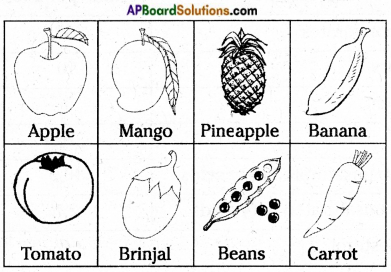
Question 7.
Prepare slogans on “Wastage of Food”.
Answer:
- Food is precious – Don’t waste food.
- Think for those who are hungry before throwing your food into the dustbin.
- Conserve food so that no one dies out of hunger.
- Today’s wastage is tomorrow’s shortage.
Question 8.
Suppose fish / raw mango/lemons are given to you, how would you preserve them?
Answer:

6th Class Science 1st Lesson The Food we Need InText Questions and Answers
Think and Discuss
6th Class Science Textbook Page No. 9
Question 1.
Now a days, we see lot of food getting wasted in all places. Food wastage is happening in our houses, schools and other places (Hostels, Hotels…etc,.) on daily and special occasions. What are the ways to avoid wastage of food ? Discuss with your teacher.
Answer:
- We should use up the left over food in the next day.
- By preparing sufficient quantities of food during functions and marriages.
- We should read the labels of the food products to know the date of manufacture and expiry.
- Be quickly on fruits and vegetables.
Question 2.
Does everyone around you get enough food to eat? If not, why?
Answer:
- No. So many people are not getting enough food to live.
- Food is not produced enough to meet the needs of overgrowing population.
- Many people are ignoring the importance of food. They are wasting the food by cooking in large quantities and throwing away during functions even in our day to day life.
- Food is very precious – Don’t waste it.
![]()
Activities and Projects
Question 1.
Collect any wrapper of packaged food. Read the information in detail and answer the following questions.
a) When was it manufactured and how long can we use it?
b) What ingredients does it contain? name them.
Answer:
a) Name of the packaged food: Britannia 50 : 50
Date of manufacturing: 19 April 2020
How long can we use it: Best before six months from packaging
b) Ingredients it contained:
| Ingredients | Value per 100g |
| Carbohydrates | 60 |
| Sugars | 10 |
| Protein | 7 |
| Fat | 26 |
| Mono unsaturated fatty acids | 10.2 |
| Poly unsaturated fatty acids | 2.7 |
| Cholesterol | 4 |
| Energy | 502 cal |
Question 2.
List out the names of some plants that grow in your village. Which parts of it are used as food?
Answer:
| Plant | Part useful as food |
| Banana | Fruits, flowers |
| Mango | Fruits |
| Spinach | Leaves |
| Coriander | Leaves |
| Sugarcane | Stem |
| Onion | Stem |
| Rice | Seeds |
| Cauli flower | Flower |
| Mint | Leaves |
| Brinjal | Fruit |
| Gongura | Leaves |
| „ Carrot | Root |
Question 3.
With the help of your teacher form groups of 5 or 6 students of your class. Make a fruit chat or vegetable salad and eat it. How did you feel? Write few lines about your experience.
Answer:
- With the help of our teacher all of our classmates were divided into 5 groups.
- To make a fruit salad we collected fruits like papaya, grapes, pineapple, mangoes, apple, banana and orange.
- We chopped all the fruits and mixed them in a bowl.
- We added Honey and fresh orange juice and lemon juice two or three spoons to the mixed fruits.
- Now all the contents are mixed well with spoon.
- Our friends tasted the fruit salad.
- We felt very tasty as its mixture of different fruits pieces.
- The taste of salad is sweet, sour and juicy.
![]()
Question 4.
Find out from your parents about the various methods of preserving food and write notes on it.
Answer:
I collected the different methods of preserving food from my parents, as given below.
| Method of preservation | Food items |
| Smoking | Fish and meat |
| Salting | Fish, Amla |
| Drying | Grains, appadalu, vadiyalu |
| Canning | Grains |
| Freezing | Vegetables and fruits |
| Mixing | Making pickles |
| Adding sugar syrup | Fruits and dry fruits |
| Pasteurization | Milk |
- Food preservation prevents the growth of the microorganisms which causes food spoilage.
- More processes designed to preserve food involve more than one food preservation method.
- Preserving fruit by turning into jam, involves boiling to reduce the moisture in the
fruits and sugaring to prevent re-growth of organisms and canning to prevent contamination in air tight jar.
Question 5.
Collect information about the main food habits of different states of India. Refer in your school, library books and discuss with your teacher and write a report on it.
Answer:
People of different states in India have different types of food habits because of different climatic and geographical conditions, and natural vegetation.
| Region /State | Food habits |
| Andhra Pradesh | Rice, curry, milk, idli, dosa, etc. |
| Telangana | Rice, curry, milk, idli, dosa, etc. |
| Karnataka | Jowar and wheat roti, ragi mudda, spicy curries. |
| Kerala | Staple food with coconut flavoured food items. |
| Gujarath | Thali, roti, dal, rice. |
| Maharashtra | Roti, kurma, pani purl. |
| Punjab | Roti, chapathi, kurma. |
| Odisha | Rice and curry. |
Question 6.
Collect information regarding ‘our traditional food’ from your grandparents.
Answer:
- The cooking is very diverse due to the vast spread of the people and varied tropical regions in A.P.
- Rice, Dal, Tomato, Gongura, and Tamarind are largely used for cooking curries.
- Spicy and hot varieties such as pickles form an important part of Telugu cuisine.
- Different communities have their own variations and the rural areas still follow the centuries-old cooking habits and recipes.
- Idly, dosa, poori and curd rice with onion is the famous varieties as the breakfast dishes.
- Broad varieties of pickles are used for preserving some of the vegetables and fruits throughout the year.
- Pakodi, janthikalu, pea snacks (guggillu), bajji are used as snacks.
- Sweets and savories form an important part of Telugu culture made on festive and auspicious occasions.
![]()
6th Class Science 1st Lesson The Food we Need Activities
Activity – 1
1. Look at the following food items in the stall: (Page No. 2)
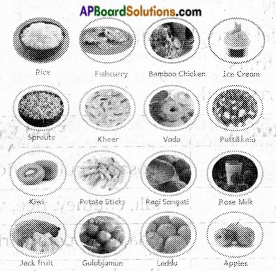
Write the names of the above food items in the table given below.

Answer:

Activity – 2
What did we eat? (Page No. 3)
2. What did you eat Yesterday? Make a list. Ask your classmates what they ate yesterday and write in the table.
| S.No. | Name of the Student | Food Eaten |
| 1. | Keerthana | Dosa, Chutney |
| 2. | ||
| 3. | ||
| 4. | ||
| 5. |
Answer:
Yes. Yesterday I ate the following items.
a) Breakfast – Milk and egg
b) Lunch – Rice, Dal, Brinjal curry, Rasam, curd
c) Evening – Biscuits and fruits
d) Dinner- Rice, potato curry, curd.
| S.No. | Name of the Student | Food Eaten |
| 1 | Keerthana | Dosa & chutney, rice, dal, vegetables, curd. |
| 2 | Ravi | Idli, chutney, rice, vegetables, egg. |
| 3 | Ashok | Chapathi, potato, rice, sambar, curd rice. |
| 4 | Ruksana | Bread, omlet, rice, tomato curry, curd. |
| 5 | Jani | Idli, coconut chutney, biryani, chicken, milk |
i) Did all the students eat the same type of food?
Answer:
No. The students did not eat the same type of food.
ii) Are there any common food items in the above list?
Answer:
Yes. Rice, dal, egg, milk, vegetables, curd are the common food items in the above list.
iii) Prepare menu chart of the food served for a week during mid-day meal in your school?
| Day | Menu |
| Monday | Rice, Sambar, egg curry, Groundnut chikki |
| Tuesday | Pulihora. Tomato Dal, Boiled egg |
| Wednesday | Vegetable rice, Kurma, Boiled egg, Groundnut chikki |
| Thursday | Kichidi, Tomato chutney, Boiled egg |
| Friday | Rice, Leafy vegetable Dal, boiled egg, Chikki |
| Saturday | Rice, Sambar, Sweet pongal |
We take different types of food every day. But some food items like rice, dal and vegetables are common. On special occasions, we eat a variety of food items. What are the food items made of?
Answer:
On special occasions we eat a variety of food items. They are Pulihora, Pongal, Payasam, Garelu, Poornalu, Daddhojanam, Vundarallu. Pulagannam, etc.
![]()
Activity – 3
Food Ingredients. (Page No. 4)
3. List out some food items and mention the ingredients required to prepare them in the table given below.
| S.No. | Food items | Required ingredients |
| 1. | ||
| 2. | ||
| 3. | ||
| 4. |
Answer:
| S.No. | Food items | Required ingredients |
| 1. | Pulihora | Rice, Tamarind, Mustard seeds, Oil, Curry leaves, Groundnut, Salt, Turmeric powder. |
| 2. | Tomato curry | Tomato, Onion, Chillies, Oil, Salt, Mustard seeds, Turmeric powder. |
| 3. | Idli | Black gram, Rice rawa, Water, Salt. |
| 4. | Aloo kurma | Potato, Oil, Salt, Chilli powder, Garam masala, Ginger and Garlic paste, Turmeric powder. |
a) Some food items and its ingredients have been listed below. Write the source of each ingredient in table. (Page No. 5)
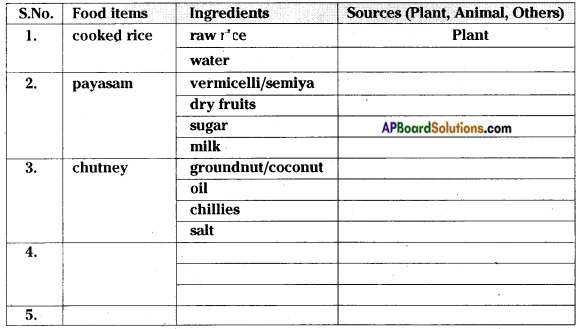
Answer:
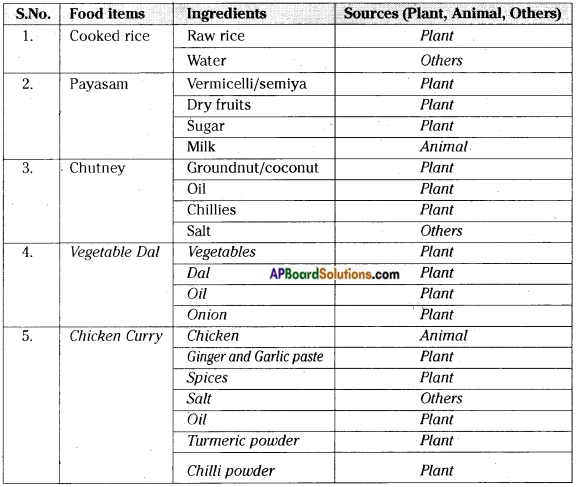
![]()
b) Write the names of the edible parts of the plant in the table – 5. (Page No. 6)
| S.No. | Name of the Plant | Parts that we eat |
| 1. | Mango | Fruit |
| 2. | Mint (Pudina) | |
| 3. | Sugar Cane | |
| 4. | Potato | |
| 5. | Onion | |
| 6. | Cauliflower | |
| 7. | Groundnut | |
| 8. | Tomato | |
| 9. | Rice | |
| 10. | Greengram | |
| 11. | Cabbage | |
| 12. | Apple |
Answer:
| S.No. | Name of the Plant | Parts that we eat |
| 1. | Mango | Fruit |
| 2. | Mint (Pudina) | Leaves |
| 3. | Sugar Cane | Stem |
| 4. | Potato | Stem (tuber) |
| 5. | Onion | Stem (bulb) |
| 6. | Cauliflower | Flower |
| 7. | Groundnut | Seeds |
| 8. | Tomato | Fruit |
| 9. | Rice | Seeds |
| 10. | Greengram | Seeds |
| 11. | Cabbage | Leaves |
| 12. | Apple | Fruit |
i) Which part of the plants do we generally eat?
Answer:
Leaves, roots, seeds and fruits of plants are generally we eat. Stems and flowers are not so widely used.
ii) Do we also use flowers as food?
Answer:
Yes, we use flowers as food. Banana flower, Cauliflower, etc.
c) Write the food items opposite to each of the process in the table – 6. (Page No. 7)
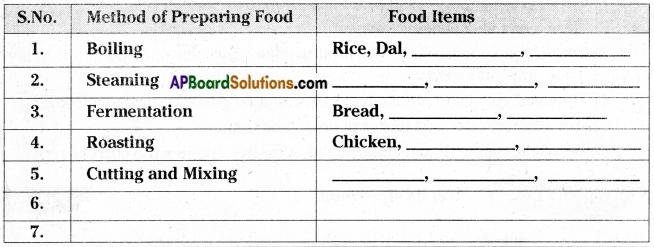
Answer:
| S.No. | Method of Preparing Food | Food Items |
| 1. | Boiling | Rice, Dal, Eggs, Potato |
| 2. | Steaming | Idli, Kudumu, Cake |
| 3. | Fermentation | Bread, Jilebi, Cake |
| 4. | Roasting | Chicken, Meat, Fish |
| 5. | Cutting and mixing | Lemon pickle, Mango pickle |
| 6. | Deep frying | Fish, Chicken, Potato chips, Vadiyalu, Appadalu |
| 7. | Microwaving | Chicken tandoori, Cake, Biscuits |
![]()
Activity – 4
Preparation of Upma. (Page No. 7)
Aim: To prepare upma
What yoy need (Ingredients): Upma rawa, onion, green chillies, oil, tomato, salt, water, mustard seeds, curry leaves, pan, etc.
What to do? (Procedure):
- Chop the clean vegetables into pieces.
- Place a pan on the flame.
- Pour 3 spoons of oil and add mustard seeds, onions, chillies, chopped vegetables and fry them.
- Pour sufficient water and add salt to it.
- Let it boil for sometime.
Then add rawa when the water gets boiled. Stir it well.
What do you see? (Observation) :After a few minutes it becomes thick, the tasty upma is ready.
What do you learn? Using different ingredients, we can make tasty upma.
i) Preparation of Tomato Curry:
Answer:
- Clean all the vegetables in water and chop them into pieces.
- Place a pan on a flame.
- Pour three spoons of oil. When oil becomes hot, put one spoon full of mustard, black gram and jeera.
- Then add green and red chilli pieces and put a pinch of turmeric powder.
- Half a minute later add pieces of onion and tomato.
- Then add some salt and close the lid. After five minutes the curry is ready.
![]()
Activity – 5
Let us store food. (Page No. 8)
5. Ask your parents the other ways of preserving the food follow and fill the table given below.
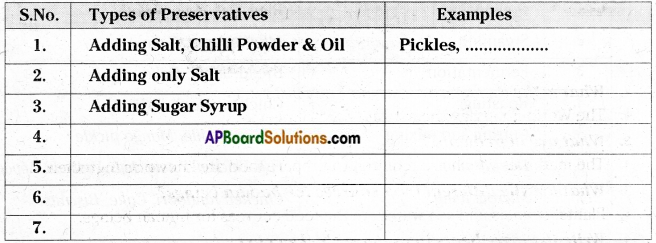
Answer:
| S.No. | Types of Preservatives | Examples |
| 1. | Adding Salt, Chilli Powder & Oil | Pickles, Chicken |
| 2. | Adding only Salt | Fish and mango |
| 3. | Adding Sugar Syrup | Fruits, Amla, Jams |
| 4. | Honey | Dry fruits, Amla, Jams |
| 5. | Freezing | Fish, Meat, Vegetables |
| 6. | Drying under sun | Fish, Meat, Vadiyalu, Appadalu |